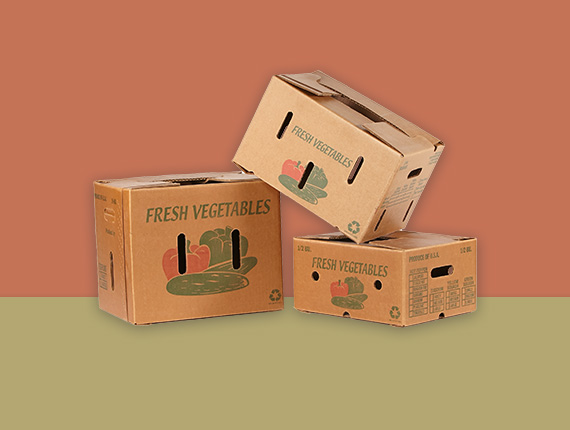Sustainability is a growing concern in today’s world, and businesses are increasingly seeking eco-friendly options to reduce their environmental impact. The produce industry is no exception, and many companies are looking for sustainable alternatives to traditional produce boxes. This article explores the various sustainable and eco-friendly options available for produce boxes wholesale, providing a comprehensive guide for businesses looking to make more environmentally responsible choices. The produce industry has a significant environmental footprint, from the resources used in farming to the packaging and transportation of goods. Implementing sustainable practices in packaging can greatly reduce this impact. Sustainable produce boxes not only benefit the environment but also cater to the growing consumer demand for eco-friendly products.
Materials Used In Eco-Friendly Produce Boxes
Recycled Paper And Cardboard
Using recycled paper and cardboard for produce boxes helps reduce the demand for virgin materials. Recycled materials use less energy and water to produce and help divert waste from landfills.
Mushroom Packaging
Mushroom packaging is an innovative and sustainable option made from agricultural waste and mycelium, the root structure of mushrooms. This biodegradable material is strong, lightweight, and can decompose in a matter of weeks.
Hemp Fiber
Hemp fiber is a versatile and sustainable material that can be used to make strong, durable produce boxes. So hemp grows quickly and requires fewer resources than traditional paper sources, making it an eco-friendly option.
Benefits Of Sustainable Produce Boxes
Sustainable produce boxes help reduce the environmental footprint of packaging. They use fewer resources, generate less waste, and often have a lower carbon footprint compared to traditional packaging materials. Eco-friendly packaging is increasingly important to consumers, many of whom are willing to pay a premium for sustainable products. Using sustainable produce boxes can enhance a company’s brand image and appeal to environmentally conscious customers. While some sustainable materials may have a higher upfront cost, they can be more cost-effective in the long run. Reusable crates, for example, can reduce the need for continuous purchases of produce boxes wholesale, leading to long-term savings. Many regions are implementing stricter regulations on packaging materials to reduce environmental impact. Using sustainable produce boxes can help companies stay compliant with these regulations and avoid potential fines.
Challenges In Implementing Sustainable Packaging
One of the main challenges in adopting sustainable packaging is the higher initial cost compared to traditional materials. However, businesses need to consider the long-term benefits and savings associated with sustainable options. Switching to sustainable packaging may require changes in the supply chain, including finding new suppliers and adapting packaging processes. This can be time-consuming and require significant effort. Consumers may not be familiar with the benefits of sustainable packaging, and businesses may need to invest in educating their customers about the advantages and proper disposal methods of these materials.
Case Studies Of Sustainable Produce Packaging
A major retailer switched to recyclable cardboard boxes for their produce section and saw a significant reduction in their packaging waste. The transition also led to positive customer feedback and increased sales from environmentally conscious shoppers. A small organic farm adopted compostable produce boxes and provided information to their customers on how to compost the packaging at home. This initiative not only reduced their environmental footprint but also strengthened their brand loyalty. A large grocery chain implemented reusable plastic crates for transporting produce from suppliers to stores. This move resulted in substantial cost savings over time and a significant reduction in single-use packaging waste.
How To Choose The Right Sustainable Produce Box
Businesses should start by assessing their specific needs, including the types of produce they sell, their supply chain logistics, and their budget. This assessment will help identify the most suitable sustainable packaging options. Understanding the different sustainable materials available and their properties is crucial. Businesses should consider factors such as durability, cost, and environmental impact when evaluating material options. Finding reliable suppliers who can provide high-quality sustainable packaging is essential. Businesses should look for suppliers with a strong track record in sustainability and a commitment to quality. Conducting a cost-benefit analysis can help businesses weigh the upfront costs against the long-term savings and benefits of sustainable packaging. This analysis should include factors such as potential regulatory compliance and consumer appeal.
Future Trends In Sustainable Produce Packaging
Ongoing research and development in biodegradable materials are likely to lead to new and improved options for sustainable produce packaging. These innovations could provide even more eco-friendly and cost-effective solutions. The circular economy focuses on minimizing waste and making the most of resources. In the future, we can expect to see more produce packaging designed with these principles in mind, promoting reuse, recycling, and sustainability. As governments continue to address environmental issues, we can expect more regulations aimed at reducing packaging waste and promoting sustainable materials. Businesses will need to stay informed and adapt to these changes to remain compliant. The demand for sustainable products is expected to continue growing, driven by increasing consumer awareness and preference for eco-friendly options. Businesses that adopt sustainable produce packaging will likely see a competitive advantage in the market.
Conclusion
Sustainable and eco-friendly produce boxes are essential for reducing the environmental impact of the produce industry. Various options, including recyclable, compostable, reusable packaging, and custom brand boxes, offer businesses multiple ways to make more sustainable choices. Custom brand boxes not only enhance brand visibility but also allow companies to showcase their commitment to sustainability through personalized, eco-friendly designs. While there are challenges to implementing these options, the benefits in terms of environmental impact, consumer appeal, and cost-effectiveness make them worthwhile investments. As the demand for sustainable products continues to grow, businesses in the produce industry must consider adopting eco-friendly packaging solutions. By choosing sustainable produce boxes, companies can reduce their environmental footprint, comply with regulations, and meet consumer expectations for greener products.

